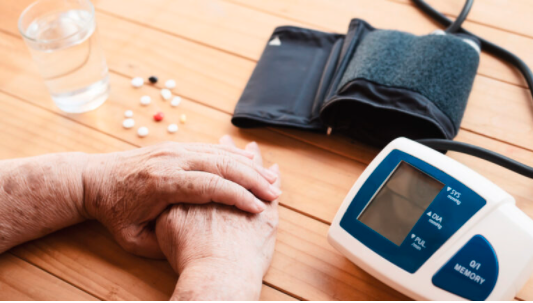Living with Diabetes
Here Is What You Need To Know
About Diabetes
Diabetes is a complex disease that requires daily self-management – making healthy food choices, staying physically active, monitoring your blood sugar and taking medications as prescribed is incredibly important. It is also important to talk regularly with your diabetes care team to problem solve, reduce risks for complications and cope with lifestyle changes.
Successful self-management will help you feel better and can reduce your chance of developing complications like heart disease, dental disease, eye disorders, kidney disease, nerve damage and more.
A key member of the diabetes management team, a diabetes care and education specialist will help you learn how to take care of yourself — guide you through your treatment and help you with any fears, issues and problems you encounter along the way.
SOURCE: Association of Diabetes Care & Education Specialists

Know Your Diabetes Care Team
It may surprise you to learn that you are the most important member of your diabetes care team.
After all, you are the one who has diabetes and who lives with it every day. Only you know how you feel and what you are willing and able to do.
You make the choices for:
- When and how you take medicine or inject insulin, if prescribed
- What food you make and eat
- And, of course, you are the first to notice any problems. Your diabetes care team depends on you to tell the truth about how you feel. You may work with many different kinds of health care providers who are part of your diabetes care team.
- When you check your blood sugar (blood glucose) and how you track the results
- When and how often you exercise
- To choose the best provider in your aria based on Clinical Outcomes

Your Care Team Members:
Primary Care Provider (PCP):
This doctor (MD or DO), nurse practitioner (NP) or physician assistant (PA) gives you routine medical care, including physical exams, lab tests and prescriptions for medication.
Endocrinologist:
This doctor (MD or DO) specializes in diabetes and other diseases of the endocrine system (the system that produces hormones such as insulin).
Ophthalmologist or Optometrist:
This doctor (MD/DO or OD), also known as an eye doctor, diagnoses and treats eye diseases and eye disorders.
Podiatrist (DPM):
This doctor, also known as a foot doctor, is trained to treat feet and lower leg problems.
Pharmacist (PharmD):
This professional knows about medicines, what’s in them and how they interact with each other.
Registered Nurse/Nurse Navigator (RN):
A nurse working in your doctor’s office who helps coordinate your health care needs.
Registered Dietitian Nutritionist (RD/RDN):
A dietitian is an expert in nutrition (what food your particular body needs to stay healthy). Talking to a registered dietitian nutritionist will help you use what you eat and drink as tools for managing your blood sugar.
Certified Diabetes Care and Education Specialist (CDCES):
Previously known as Certified Diabetes Educators (CDEs), these are health care providers with extensive training and experience working with people with diabetes, and who have passed a credentialed board exam. They can help you figure out how to manage the things you need to do to take care of your diabetes, in a way that fits with your daily life, routines, environment and family dynamics. To work with an expert in a diabetes education program recognized by the American Diabetes Association.
Mental Health Professional:
This person may be a psychiatrist (MD or DO), psychologist (PhD) or clinical social worker (LCSW or LISW). These professionals can help you deal with the day-to-day challenges of living with diabetes as well as more serious emotional issues. Be sure to work with a mental health professional who understands diabetes and the medicine and insulin you are taking that may affect your blood sugar.
Fitness Professional:
A physical activity specialist may be an exercise physiologist, personal trainer or physical therapist. These professionals can help you find exercises that are safe for you, and ensure you get the most out of your exercise program. Be sure to work with a fitness professional who understands diabetes and the medicine and insulin you are taking that may affect your blood sugar.
Know Your Diabetes ABCs.
A for the A1C test
It shows what your blood glucose has been over the last three months. The A1C goal for many people is below 7. High blood glucose can harm your heart and blood vessels, kidneys, feet, and eyes.

B for Blood pressure
The goal for most people with diabetes is below 130/80. High blood pressure makes your heart work too hard. It can cause heart attack, stroke, and kidney disease.

C for Cholesterol
The LDL goal for people with diabetes is below 100.The HDL for men is greater than 40. The HDL for women is greater than 50. LDL or “bad” cholesterol can build up and clog your blood vessels. It can cause a heart attack or a stroke. HDL or “good” cholesterol helps remove cholesterol from your blood vessels.
Ask your health care team:
- What your A1C, blood pressure, and cholesterol numbers are
- What your A1C*, blood pressure, and cholesterol numbers should be
- What you can do to reach your targets

Manage your diabetes
Many people avoid the long-term problems of diabetes by taking good care of themselves. Work with your health care team to reach your ABC target.
Use this self-care plan.
Follow your diabetes meal plan. If you do not have one, ask your health care team to help you develop a meal plan.
Eat healthy foods such as fruits and vegetables, fish, lean meats, chicken or turkey without the skin, dry peas or beans, whole grains, and low-fat or skim milk and cheese.
Keep fish and lean meat and poultry portions to about 3 ounces(or the size of a deck of cards).Bake, broil, or grill it.
Eat foods with more fibersuch as whole-grain cereals, breads, crackers, rice, or pasta.
Get 30 to 60 minutes of physical activity on most days of the week. Brisk walking is a great way to move more.
Stay at a healthy weight by using your meal plan and moving more.
Stop smoking. Ask for help to quit
Ask for help if you feel down.A mental health counselor, support group, member of the clergy, friend,or family member who will listen to your concerns may help you feel better.
Learn to cope with stress.Stress can raise your blood glucose. While it is hard to remove stress from your life, you can learn to handle it.
Take medicines even when you feel good Tell your doctor if you have any side effects.
Check your feet every day for cuts, blisters, red spots, and swelling. Call your health care team right away about any sores that do not go away
Brush your teeth and floss everyday to avoid problems with your mouth, teeth, or gums.
Check your blood glucose.You may want to test it one or more times a day. Be sure to follow your healthcare team instructions.
Check your blood pressureif your doctor advises.
Report any changes in your eyesight to your healthcare team.
Get routine care
See your health care team at least twice a year to find and treat any problems early.
At each visit be sure you have a:
- blood pressure check
- foot check
- weight check
- review of your self-care plan
Two times each year have an:
A1C test – it may be checked more often if it is over 7
Once each year be sure you have a:
- cholesterol test
- triglyceride test — a type of blood fat
- complete foot exam
- dental exam to check teeth and gums — tell your dentist you have diabetes
- dilated eye exam to check for eye problems
- urine and a blood test to check for kidney problems
At least once get a:
- pneumonia shot
SOURCE: National Diabetes Education Program
